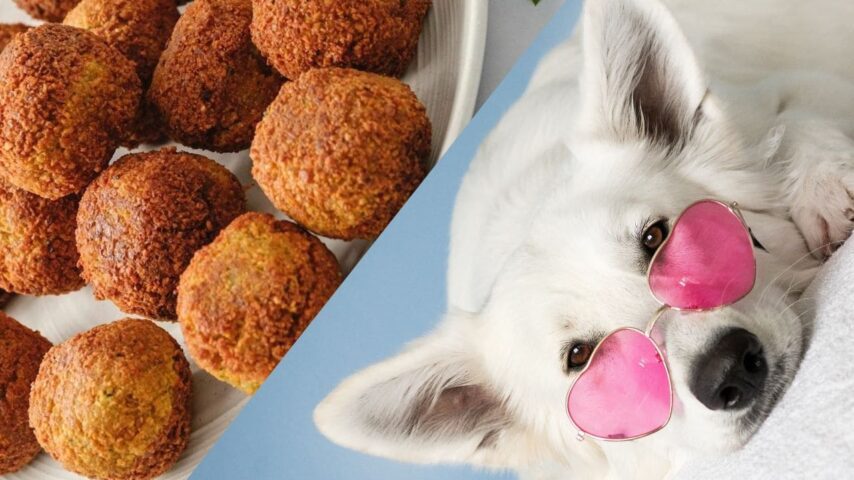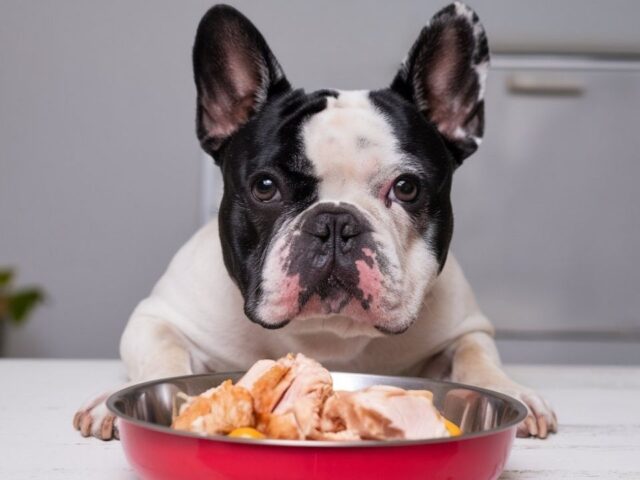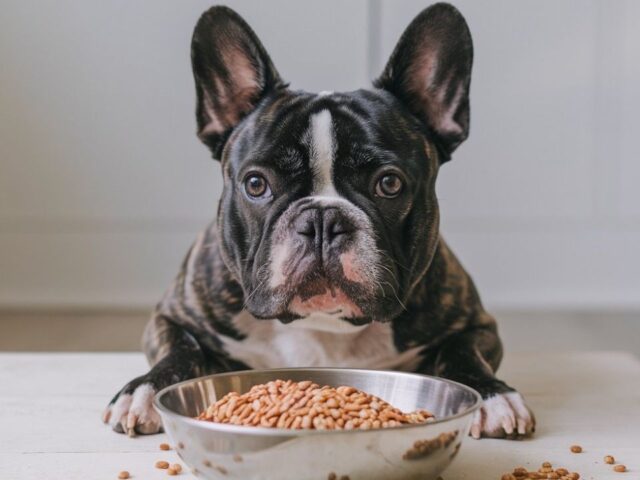As a responsible pet owner, ensuring the safety and well-being of your furry friend is a top priority. Many dog lovers often wonder if their canine companions can safely eat some of their favorite human foods, like the delicious Mediterranean treat – falafel. But can dogs eat falafel without any negative consequences?
In this comprehensive guide for pet owners, we delve into what makes up this popular dish, evaluate its potential risks and benefits for dogs, and offer healthy alternatives to keep your pup both satisfied and safe.
The answer to the question of whether dogs can eat falafel is “NO” due to the potential health risks associated with its ingredients for dogs, as it contains garlic and onions that can cause anemia, red blood cell damage, and digestive distress.
Table of Contents
- 1. Key Takeaways
- 2. Understanding Falafel And Its Ingredients
- 3. Can Dogs Eat Falafel?
- 3.1 Potential Health Benefits Of Falafel For Dogs
- 3.2 Risks And Concerns Of Feeding Falafel To Dogs
- 3.3 Ingredients In Falafel That Can Be Toxic To Dogs
- 3.4 Possible Choking Hazards
- 3.5 Possible Side Effects
- 4. Safe And Healthy Alternatives To Falafel For Dogs
- 5. Recommendations For Pet Owners
- 5.1 Consult Your Veterinarian Before Introducing Falafel To Your Dog
- 5.2 Be Mindful Of Your Dog’s Diet And Nutritional Needs
- 5.3 Choose Safe And Nutritious Treats For Your Furry Friend
- 5.4 Practice Moderation When Feeding Your Dog Any Human Food
- 6. Final Thoughts on Can Dogs Eat Falafel
- 7. FAQs on Can Dogs Eat Falafel
Key Takeaways
- Falafel is not a safe food for dogs due to the toxic ingredients like garlic and onions that can cause anemia, red blood cell damage, and digestive distress.
- While some of the individual ingredients used in falafel may provide health benefits to dogs such as protein and fiber from chickpeas, there are other sources of these nutrients that are more appropriate for dogs than falafel.
- Pet owners should consider safe alternatives to feed their furry friends such as dog-friendly vegetables and proteins like sweet potatoes, carrots, green beans, chicken or turkey; homemade treats made with peanut butter or fruits; or vet-approved commercial dog food.
- Consultation with a veterinarian is essential before introducing any new human food into your dog’s diet because each pet’s nutritional needs vary based on age, weight, activity level, underlying health conditions.
Understanding Falafel And Its Ingredients
Falafel is a popular Middle Eastern dish made from ground chickpeas, herbs, and spices that are formed into balls or patties and deep-fried.
What Is Falafel?
Falafel is a popular Mediterranean and Middle Eastern dish typically made from ground chickpeas, fava beans, or both. This mixture is combined with various herbs, spices, onions, and garlic to create a flavorful dough that is then rolled into small balls or patties before being deep-fried.
The origins of falafel can be traced back to ancient Egypt where it was initially made using fava beans exclusively. Over time, the recipe spread across the Mediterranean region and evolved to include other ingredients like chickpeas which are now commonplace in today’s modern iterations of falafel dishes.
What Are The Common Ingredients In Falafel?
Falafel is a popular Middle Eastern dish made of ground chickpeas or fava beans, and its ingredients vary based on the recipe used. However, common ingredients in falafel include:
- Chickpeas or fava beans
- Onions and garlic (which can be harmful to dogs)
- Herbs such as parsley and cilantro for flavor
- Spices like cumin and coriander for seasoning
- Flour or breadcrumbs to bind the ingredients together
- Oil for frying
It’s important to note that these ingredients are not safe for dogs, and pet owners should avoid feeding falafel to their furry friends.
Can Dogs Eat Falafel?

While falafel may seem like a tasty treat to share with your furry friend, it’s important for pet owners to understand the potential risks and concerns before feeding falafel to their dogs.
Potential Health Benefits Of Falafel For Dogs
While falafel is not recommended for dogs, some of the individual ingredients that are used in falafel can provide health benefits to your furry friend. For example, chickpeas are a great source of protein and fiber, which can aid in digestion and promote satiety.
Additionally, herbs like parsley or coriander may offer anti-inflammatory properties and help freshen your dog’s breath. However, it’s important to note that there are other sources of these nutrients that are more appropriate for dogs than falafel.
Risks And Concerns Of Feeding Falafel To Dogs
Feeding your furry friend falafel can have some serious risks and concerns. For starters, many traditional recipes for falafel include onions, garlic, and other spices that are toxic to dogs.
Even small amounts of these ingredients can result in unpleasant side effects like vomiting and diarrhea.
Moreover, the high-fat content of deep-fried foods like falafel can lead to obesity or other health issues in dogs over time. While chickpeas themselves are not harmful to dogs if fed in moderation, it’s best to avoid feeding them food designed for human consumption altogether as their dietary requirements differ from ours.
Ingredients In Falafel That Can Be Toxic To Dogs
Falafel contains several ingredients that can be toxic to dogs, including onions, garlic, spices, and herbs. These ingredients can cause anemia and damage your dog’s red blood cells, leading to weakness and fatigue. The high sodium content in falafel can also be harmful to dogs, causing vomiting and diarrhea. Additionally, the deep-fried nature of falafel means that it is high in fat content, which can lead to obesity and other health problems in dogs. Pet owners should avoid feeding their furry friends foods containing these toxic ingredients to ensure their health and safety.
Possible Choking Hazards
Dogs can be prone to choking on certain foods, and falafel presents a potential risk in this regard. Dried chickpeas, which are a key ingredient in falafel, can pose a danger as they are small and hard.
When dogs swallow such objects whole, they can get lodged in their throats and cause blockages that prevent them from breathing normally. Moreover, the crispy exterior of falafel balls may also pose a risk for choking if not chewed properly by dogs.
Possible Side Effects
Feeding your dog falafel can result in a variety of negative side effects. Dogs may experience digestive distress, including nausea and vomiting, from eating this deep-fried dish.
Furthermore, if dried chickpeas are not cooked properly or are fed whole, they can pose a choking hazard to dogs. It is important to keep an eye on your furry friend’s health and behavior after feeding them human food like falafel as it could lead to long-term health implications if ingested frequently.
Safe And Healthy Alternatives To Falafel For Dogs
If you’re looking for safe and healthy alternatives to falafel, try dog-friendly vegetables and proteins, homemade treats, or vet-approved commercial dog food – keep reading to learn more!
Dog-Friendly Vegetables And Proteins
If you want to give your furry friend a healthy treat, there are plenty of dog-friendly vegetables and proteins to choose from. Here are some of the best options:
- Sweet potatoes: These are a great source of fiber, vitamins, and antioxidants. They’re also easy to digest, making them a good choice for dogs with sensitive stomachs.
- Carrots: Carrots are another excellent source of fiber and antioxidants. They’re also low in calories, which makes them a good option if your dog needs to lose weight.
- Green beans: These are a good source of protein and fiber. They’re also low in calories and can help your dog feel full without overeating.
- Chicken: This is a lean protein that’s easy for dogs to digest. It’s also a good source of amino acids, which can help support muscle growth and repair.
- Turkey: Similar to chicken, turkey is another lean protein that’s easy for dogs to digest. It’s also high in vitamin B6, which can help regulate blood sugar levels.
- Salmon: This is an excellent source of omega-3 fatty acids, which can help improve skin and coat health. It’s also low in calories and high in protein.
Remember that even though these foods are safe for dogs to eat, they should still be fed in moderation as part of a balanced diet. Consult your veterinarian before making any changes to your dog’s diet or feeding them new foods like vegetables and proteins.
Homemade Dog Treats
If you’re looking for a safe and healthy alternative to falafel for your furry friend, consider making homemade dog treats. Here are some ideas:
- Peanut Butter and Banana Bites: Mix mashed ripe bananas, natural peanut butter, and rolled oats together. Form into balls and place in the refrigerator to chill.
- Sweet Potato Chips: Slice sweet potatoes thinly and bake in the oven until crisp.
- Chicken Jerky: Cut chicken breasts into thin strips and bake in a low-temperature oven until fully dried out.
- Carrot Sticks: Cut fresh carrots into sticks or coins for a crunchy snack.
- Frozen Yogurt Drops: Mix plain Greek yogurt with pureed fruit such as blueberries or strawberries. Drop small spoonfuls onto a baking sheet lined with parchment paper and freeze until solid.
Remember to always consult with your veterinarian before introducing any new foods to your dog’s diet, including homemade treats. Additionally, be mindful of portion sizes as treats should only make up a small portion of your dog’s overall diet.
Keywords used: Homemade dog treats, safe human foods for pets, pet dietary restrictions, healthy pet treats
Vet-Approved Commercial Dog Food
If you are not confident in preparing homemade meals or treats for your furry friend, vet-approved commercial dog food is another option to consider. These types of foods can offer a complete and balanced diet for dogs, ensuring they receive all the necessary nutrients they need to maintain good health.
When selecting a commercial dog food, look for brands that have high-quality protein sources as their first ingredient, such as chicken or fish.
It’s important to remember that every dog’s nutritional needs are different based on factors such as age, weight, activity level, and any underlying health conditions. Therefore it’s vital to consult your veterinarian before choosing the right food brand for your pet.
Recommendations For Pet Owners
“Consult with your veterinarian before introducing falafel or any new human food to your dog, and make sure to choose safe and nutritious treats for your furry friend. Practice moderation when feeding them any human food, and always be mindful of their diet and nutritional needs.
Consult Your Veterinarian Before Introducing Falafel To Your Dog
Before giving your dog any human food, including falafel, it is important to consult with your veterinarian.
Your vet may advise against feeding falafel due to its high-fat content or the potential toxicity of some of its ingredients like onions and garlic.
Remember that dogs have a different digestive system than us humans. So while we may enjoy our favorite meals without any problems, certain foods can be hazardous for pets.
It’s always good practice to check in with your vet before introducing new types of food into your dog’s diet.
Be Mindful Of Your Dog’s Diet And Nutritional Needs
As pet owners, we want to ensure the health and well-being of our furry friends. One way we can do this is by being mindful of their diet and nutritional needs. Dogs have different dietary requirements than humans, so it’s important to choose food that meets their specific needs.
Feeding dogs a balanced diet can help prevent obesity, maintain healthy skin and fur, support good digestion, and strengthen their immune system. Incorporating safe dog-friendly fruits and vegetables into their meals or choosing vet-approved commercial dog food are great options for ensuring your dog receives all the necessary nutrients they need without putting them at risk for possible toxins found in human foods like falafel.
Choose Safe And Nutritious Treats For Your Furry Friend
As pet owners, it’s important to choose safe and nutritious treats for our furry friends. While you may be tempted to share your falafel with your dog, it’s best to avoid it due to potential health risks.
Instead, consider giving your pup dog-friendly vegetables like carrots or green beans as a snack.
It’s also essential to pay attention to the nutritional content of any treats you give your dog. Look for options that are high in protein and low in fat and sugar, since dogs have different dietary needs than humans do.
Practice Moderation When Feeding Your Dog Any Human Food
As a pet owner, it’s important to remember that your dog has different dietary requirements than you. While sharing food with your furry friend can be tempting, it’s crucial to practice moderation and only offer them foods that are safe for their consumption.
Feeding dogs human food in excess or without proper understanding of its nutritional value and potential risks can lead to health problems such as obesity, digestive issues, and nutrient deficiencies.
When feeding any human food to your dog, make sure they are getting all the necessary nutrients from their regular diet first. Treats should not exceed 10% of your dog’s total daily caloric intake.
Some safe options include cooked vegetables like sweet potatoes and green beans or lean proteins such as chicken or turkey.
Final Thoughts on Can Dogs Eat Falafel
In conclusion, falafel is not a safe food for dogs and should be avoided. While chickpeas themselves are not harmful to dogs in moderation, the numerous other ingredients in falafel can cause digestive issues and even toxicity.
It’s crucial for pet owners to consult with their veterinarian before introducing any human food into their dog’s diet. Instead of feeding your furry friend falafel, consider healthy alternatives such as vet-approved commercial dog food or homemade treats made with dog-friendly vegetables and proteins.
FAQs on Can Dogs Eat Falafel
It is not recommended for dogs to consume falafel as it contains several ingredients like onions and garlic that can be toxic and detrimental to their health. Additionally, falafel balls are often fried in oil which can also upset a dog’s stomach.
Falafel contains potentially harmful ingredients such as onions, garlic, and spices that could cause digestive discomfort or even toxicity in dogs if consumed regularly or in significant amounts over time. It’s best to avoid giving your pets any foods with these ingredients altogether.
If you’re looking for alternative treats for your furry friend, there are plenty of healthy options available such as lean meats, fruits/vegetables (minus those toxic to dogs), plain yogurt or cottage cheese, peanut butter etc., but at all times – always start slow & monitor reactions before adding too much into daily routines!
If your pet accidentally consumes a small amount of falafel without any visible symptoms they will usually recover within a day or two without need for treatment however larger amounts could result in serious illness therefore it is wise contacting veterinarian immediately following ingestion so they may advise what action needs taken based on severity / symptoms seen like vomiting/diarrhea or more serious issues related poisoning risk factors!
Read More Interesting Articles on Dogs:
- Can Dogs Eat Farro? Exploring the Benefits and Risks
- Can Dogs Safely Eat Corn? Expert’s Guide to Feeding Corn To Your Dog
- Do Dogs Really Have Uvulas? Everything You Need to Know
- Can Dogs Get Acne and How to Cure It!
- Can Dogs Eat Egg Rolls? Read Before Feeding Egg Rolls to Your Pet
- Can Dogs Eat Croutons? Must Read Before Feeding Your Dog Croutons










